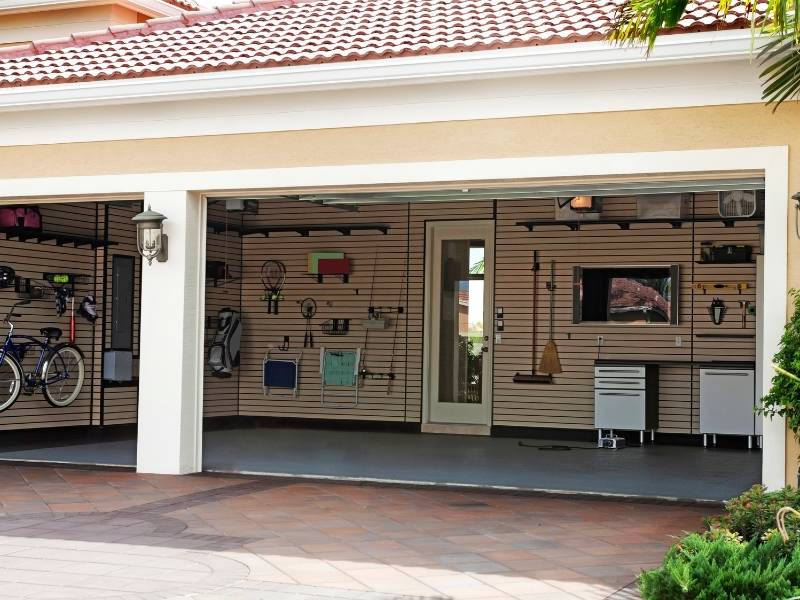Moisture causes your garage floor to sweat. However, you can prevent it by reducing air humidity, heating the garage, improving air circulation, and much more.
A sweating garage floor can cause problems such as creating a slippery floor or making the environment of the garage damp.
This increases the humidity of the garage room and damages metal objects, as it makes rust form in the metal objects. A slippery surface can also be responsible for accidents and might cause injury.
Therefore, it is very important to understand why the garage floor sweats in the first place and how you can prevent it. If your garage floor needs help, continue reading to learn about five ways to eliminate the garage floor sweats.
5 Ways to Stop the Garage Floor Sweats

What Causes Garage Floor Sweats?
You might often see the garage floor getting wet and slippery. The main reason for this slippery surface is the condensation of moisture, also known as garage floor sweating.
When you pour a cold drink into a glass, you might notice that the outer surface of the glass sweats. Why does that happen? Because when the cold drink touches the glass, it becomes very cold. Then, as the warm and moist outer air comes in contact with the glass, it gets cold.
At a certain temperature, the water vapor in the air starts to form into water droplets. These water droplets are the sweat we see on the surface of the glass. In the concrete industry, this is known as Sweating Slab Syndrome. Interestingly, the sweating of the garage floor follows the same principle.
The surface of the garage, the concrete floor can be very cool, especially at night. When the warm moist air comes in contact with the cooler surface of the garage, the air cools down as well. As it cools down, it gets denser.
Now, if the surface of the garage door is the same or lower than the dew point, then the water vapor present in the air will form water droplets. As the air comes into contact with the cold surface, the vapor condenses and creates water droplets.
These water droplets then fall onto the floor and stay there. As the floor of the garage is refined, it is not very porous. Therefore, it cannot absorb water instantly. Then, as water droplets slowly compile on the floor, it gets wet. This entire process is known as garage floor sweating.
However, sometimes the surface material of your garage is faulty. If you decide to completely change the flooring then check out this website to know everything about the different flooring types you can use.
Is it the Garage Floor Sweats or a Moisture Problem?
If the floor of the garage is wet, it might not always be due to sweating. In fact, two things can get the floor wet. One is the sweating of the floor, and the other is the moisture problem from under the slab. So, to prevent sweating, you first need to find out if the floor is sweating or not.
To test this, first, get a heavy piece of plastic 16-inches square. Place the plastic on the floor and seal all the edges.
When you notice that the floor is getting wet, remove the plastic. If you see the surface beneath the plastic is dry while the rest of the area is wet, then you have a sweating problem.
However, if the place under the plastic is wet along with the surrounding area, that is because of the moisture problem under the concrete slab.
Preventing the Garage Floor Sweats
Now after the test, you can figure out if the garage floor is sweating. Here are 5 ways to prevent it.
1. Reduce Air Humidity
The main thing that creates this issue is the humidity in the air. To make the air less humid, you can buy a dehumidifier. This is the best tool for reducing humidity.
What dehumidifier you need to buy depends on the size of the garage. For a garage that is about 400-500 square feet, you need a dehumidifier that covers 2500 square feet. A very popular 2500 square feet dehumidifier would be the 6-gallon Dehumidifier by home labs.
2. Better Air Circulation
If air does not stay longer in the garage, then it will not have enough time to be condensed. And if the air does not get condensed, there will be no sweating. So, increasing the air circulation of the garage is a good way to prevent garage floor sweating.
You can get large oscillating fans, wall mount fans, or even some ceiling fans. Keep the fan on for a certain time, and it will help keep your garage dry.
3. Heating The Garage
As we have seen before, the reason behind the condensation of the air is the cold surface of the garage floor. So, if you prevent the floor from getting too cold, it cannot condensate the surrounding air. This way, you can prevent the garage floors from sweating.
So, to heat the garage, you can buy heaters. One very effective and cheap heater is the PELONIS NTH15-17BRA Portable 1500W Vertical and Horizontal Ceramic Tower Space Heater. This heater is also eco-friendly, so bonus points for that.
4. Consider Floor Mats
Concretes can get cold because the surface has very high albedo, meaning it reflects heat easily but does not absorb very much. So, if there is a mat on top of the garage floor, it will prevent the floor from sweating and also keep it clean.
Some effective mats are interlocking garage floor tiles, vinyl mats, and automotive approved carpet.
5. Keep The Garage Door Tightly Sealed
When you close your garage door, you will notice that there will still be small spaces between the garage door and the floor. Air passes through these spaces and enters the garage, thus causing the whole garage floor to sweat.
You can easily prevent this by blocking off these small spaces. Things like a garage floor door seal can greatly help, or you can use different types of home insulation.
In Conclusion
A wet and slippery garage floor can be very stressful. It not only makes the floor soggy but looking at the garage will also feel uncomfortable. So, the steps in this article will help you with all the things you need to know about garage floor sweating and how you can prevent it.
Images Courtesy of Canva.
Other Posts You Might Enjoy:
3 Fast & Easy Ways for Efficient Garage Organization
Should You Replace Your Garage Door Over the Winter?





